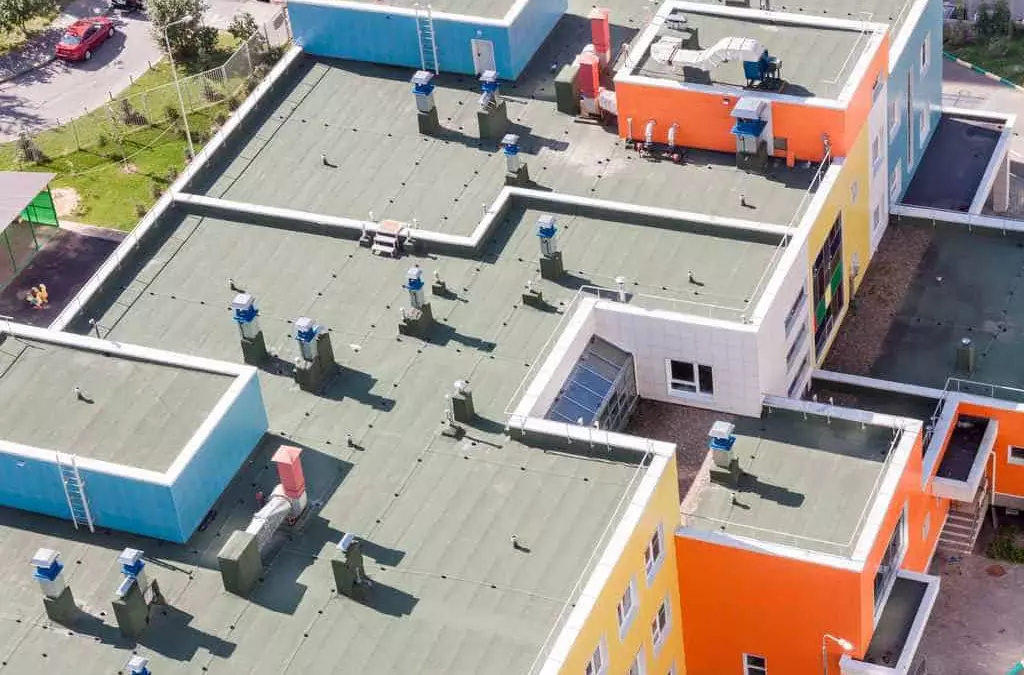Flat roofing is a versatile and practical option for a wide range of buildings, from residential homes to commercial structures and industrial facilities. It offers unique advantages, such as ease of access, efficient use of space, and cost-effectiveness. In this blog, we’ll explore the applications and considerations of flat roofing for various types of buildings.
1. Residential Buildings:
Advantages: Flat roofs are becoming increasingly popular for residential homes, particularly in urban areas. They provide additional outdoor space for gardens, patios, or rooftop decks. They are also cost-effective and allow for efficient HVAC system placement.
Considerations: Proper drainage is crucial to prevent water pooling and leakage. Regular maintenance and inspections are necessary to ensure the roof’s integrity, especially in regions with variable weather conditions.
2. Commercial Buildings:
Advantages: Many commercial buildings, including office complexes, retail spaces, and warehouses, feature flat roofing due to its cost-effectiveness and ease of installation. Flat roofs allow for the installation of HVAC units, solar panels, and other equipment.
Considerations: Commercial buildings often have large, flat roof surfaces that require robust waterproofing and insulation systems. Regular maintenance is essential to prevent leaks and extend the roof’s lifespan.
3. Industrial Buildings:
Advantages: Industrial facilities, such as factories and warehouses, often have large, flat roofs to accommodate heavy equipment and machinery. Flat roofing provides easy access for maintenance and installation of industrial infrastructure.
Considerations: These roofs require robust construction and waterproofing to withstand heavy loads and industrial activities. Regular inspections are essential to identify and address any potential issues promptly.
4. Educational Institutions:
Advantages: Schools and universities can benefit from flat roofs by using the space for recreational areas, outdoor classrooms, or rooftop gardens. Flat roofs are often chosen for new educational buildings to maximize usable space.
Considerations: Safety considerations are paramount when using flat roofs for educational purposes. Proper railing and safety measures should be in place to protect students and staff.
5. Healthcare Facilities:
Advantages: Flat roofs can be advantageous for healthcare facilities to install HVAC systems and other equipment efficiently. They can also be used for healing gardens or relaxation areas for patients.
Considerations: Healthcare facilities must maintain a sterile environment, making roof maintenance and drainage systems crucial to prevent contamination or damage to sensitive equipment.
6. Residential Apartment Buildings:
Advantages: Flat roofs are a common choice for apartment buildings because they provide additional outdoor living space for tenants, such as rooftop gardens, seating areas, or communal spaces.
Considerations: Proper waterproofing and insulation are essential to prevent water infiltration and maintain comfortable living conditions for tenants. Regular inspections and maintenance can prevent issues.
7. Retail Spaces:
Advantages: Many retail spaces with flat roofs can use the rooftop for signage, advertising, or additional storage space. It allows for the efficient placement of HVAC units and other equipment.
Considerations: Proper waterproofing is vital to protect merchandise and maintain a comfortable shopping environment. Regular inspections are necessary to identify and address any leaks or damage.
8. Government Buildings:
Advantages: Government buildings often have flat roofs due to their cost-effectiveness and versatility. These roofs can accommodate solar panels, green roofs, or other energy-efficient features.
Considerations: Government buildings should prioritize energy efficiency and sustainability when designing and maintaining flat roofs. Regular inspections can ensure these features continue to operate effectively.
9. Hospitality Industry:
Advantages: Hotels and resorts often use flat roofs for their versatility in creating attractive rooftop bars, lounges, or event spaces, providing guests with scenic views.
Considerations: Waterproofing and drainage systems are essential to prevent water infiltration into guest rooms or event spaces. Regular maintenance and safety measures are crucial for guest safety.
In conclusion, flat roofing offers a variety of benefits and applications across different types of buildings. Whether for residential, commercial, industrial, or institutional purposes, flat roofs can provide additional space, accommodate equipment, and support sustainable features. However, proper design, construction, and maintenance are essential to ensuring the longevity and functionality of flat roofing systems in different building contexts. Regular inspections and proactive maintenance efforts are key to identifying and addressing potential issues before they become costly problems.
Flat Roofing Orange County https://www.flatroofingorangecounty.com


